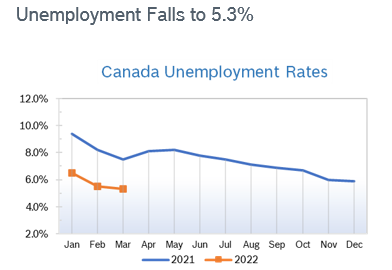Consumer Prices Rise 5.7% The Consumer Price Index (CPI) rose 5.7% year over year in February after rising 5.1% in January, according to Statistics Canada. It was the second consecutive month the CPI has been over 5%; the last time the CPI was over 5% was in 1991. It was the eleventh consecutive month that inflation has exceeded the Bank of Canada’s (BoC) target range of 1% to 3%. Price increases were broad-based in February. Excluding gasoline, the CPI was up 4.7% year over year in February. On a monthly basis the CPI was up 1.0%, the largest monthly increase since 2013. Supply chain disruptions, extreme weather events and labour shortages all contributed to the increase. Shelter costs jumped 6.6% year over year. Bank of Canada Raises Rates The Bank of Canada (BoC) raised interest rates in March by 25 basis points to 0.5%. The increase was widely expected. Economists say it will take multiple interest rate increases before borrowing costs rise enough to impact the housing market. For most of the pandemic, there have been multiple bids on every property, something that was previously very uncommon. Housing and Construction News Canadian housing starts rose 8% in February to 247,256 units, beating analysts’ expectations after starts fell in January. However, the six-month moving average of 251,579 units was about 1% below the six-month average in January, according to Canada Mortgage and Housing Corporation (CMHC). Toronto was the only market among Canada’s three largest cities to see housing starts rise; the increase was largely driven by condo and multi-unit starts. Supply chain issues and labour shortages have brought some developments to a standstill. Home sales in January fell 10.7% to 33,166, according to the Canada Real Estate Association (CREA). On a seasonally adjusted basis, home sales in January were up 1.0% compared with December. The number of newly listed homes fell 11% month over month in January. The national average home price was a record $748,450 in January, up 21% from a year earlier. Excluding Greater Vancouver and Greater Toronto, two of Canada’s most active and expensive housing markets, reduces the national average price by almost $160,000. Retail Sales Rise 3.2% Retail sales rose 3.2% to $58.9 billion in January after falling to $57.0 billion in December. Sales were up in 9 of 11 subsectors, representing 85.5% of retail trade. Core retail sales, which exclude gasoline stations and motor vehicle and parts dealers, increased 2.9%. In volume terms, retail sales were up 2.9% in January. Leading the increase were higher sales at building material and garden equipment and supplies dealers (+8.9%), which increased for the fifth time in six months. The increase in January was also the fastest pace of growth recorded in this subsector since March 2021 (+21.5%). Retail Ecommerce Sales Rise 8.3% On a seasonally adjusted basis, retail ecommerce sales were up 8.3% in January after falling 10.3% in December. On an unadjusted basis, retail ecommerce sales were down 14.4% year over year to $3.2 billion in January, accounting for 6.3% of total retail trade. The share of ecommerce sales out of total retail sales fell 1.8% compared with January 2021, when retailers were mandated to close their brick and mortar stores to in-person shopping in many regions across the country. Retail Notes Canadian Tire will spend $3.4 billion over the next four years to improve their ecommerce operations, launch thousands of products, expand their loyalty program and improve the efficiency of their supply chain. They plan to invest $2.2 billion to build their digital operations, with about half of that going toward improving the digital services connected to physical stores. That will include speeding up curbside pickup, rolling out lockers for automated pickup and creating connected stores with digital appointments and more mobile app features to help customers find what they are looking for. The strategic decision to have the core of their ecommerce strategy flow through the store gives them a big advantage over ecommerce operations that don’t have physical stores. Their home-delivery volume is now five times larger than it was in 2019. Another $675 million will go toward improving their supply chain. They are also expanding their Triangle Rewards loyalty program to encourage more repeat visits by shoppers. Loyalty members tend to spend more and now account for 58% of sales; CT wants to increase that to 63% of sales. They have been testing a Triangle Select program that will launch nationally this year. For an $89 annual fee, the program provides perks and is designed to encourage shoppers to buy more private labels brands, which now account for $5.7 billion in annual sales. They plan to launch more than 12,000 additional private label products across all their store chains. © Robert Bosch Tool Corporation. All rights reserved, no copying or reproducing is permitted without prior written approval
Comments are closed.
|
Archives
July 2024
|








